
Patients often think of supplements as vitamins and minerals that only need to be taken as needed for potential nutrient deficiencies or inadequacies. However, naturopathic physicians, functional medicine doctors, and other highly-skilled healthcare providers know supplements can offer much more and manifest powerful synergistic benefits that go far beyond simply replacing the vitamins and minerals that could be missing from the diet.
Indeed, it is true that supplements can fill nutrient gaps in an unhealthy diet, and there are numerous reasons why many patients need extra vitamins and minerals. As thoroughly discussed in this interesting blog post, modern agriculture and food processing methods, dietary restrictions, life stages that require extra nutrients, certain health conditions, and several lifestyle factors, especially chronic stress, could increase the need for certain nutrients.

Chronic stress is a frequent underlying cause of nutrient insufficiencies and health concerns. In fact, according to figures from the World Health Organization (WHO), nearly 450 million people worldwide are affected by stress-related disorders. Research indicates stress could be responsible for an estimated 70% of visits to primary care providers, which is shocking.1
Fortunately, the consistent use of a potent synergistic blend of vitamins, minerals, and herbal extracts could provide profound health benefits, especially during stressful times.2 Truly, adrenal support supplements that nourish the adrenal glands are a fundamental and indispensable part of an effective stress management program.

What is adrenal support?
Adrenal support includes vitamins, minerals, botanical extracts, and other nutraceuticals that support the balanced function of the adrenal glands by supplying the nutrients required by the adrenal glands and optimizing the adrenal response. The nutraceuticals mentioned below are evidence-based options that can support adrenal function and alleviate stress to prevent adrenal fatigue.3
What is adrenal fatigue?
Chronic stress may lead to a conceptual condition known as adrenal fatigue, which is similar to burnout syndrome.3,4 Adrenal fatigue is not a medical diagnosis but rather a general term for a great number of symptoms that indicate the body could be struggling to cope with stress. The first person to define the term “adrenal fatigue” was a Naturopathic Doctor (ND) and Chiropractor named Dr. James Wilson.4
Screening for the presence of adrenal fatigue requires our Adrenal Stress Index Panel, which assesses adrenal function and its impact on other systems. Chronic stress and suboptimal adrenal function are associated with many conditions and symptoms including, but not limited to:5
- Low or high blood pressure
- Heart disease
- Diabetes
- Obesity
- Insulin resistance
- Depression
- Anxiety
- Skin problems, such as acne or eczema
- Menstrual problems
- Diarrhea
- Constipation
- Forgetfulness
- Frequent aches and pains
- Headaches
- Lethargy or low energy levels
- Lack of concentration and focus
- Osteoporosis
- Sexual problems
- Insomnia or sleeping too much
- Upset stomach
- The use of alcohol or drugs to relax
- Unexplained weight loss
- Abnormal weight gain
Evidence-Based Adrenal Support
Organic Ashwagandha (Withania somnifera)
Ashwagandha (Withania somnifera) is a botanical medicine prescribed for more than 3000 years in Ayurvedic medicine. Ayurvedic practitioners prescribe Ashwagandha for improving cognitive health, stress management, energy support, anxiety, insomnia, and other health concerns.6,7 The withanolides in Ashwagandha are the compounds responsible for the beneficial and relaxing adrenal restorative effects.8
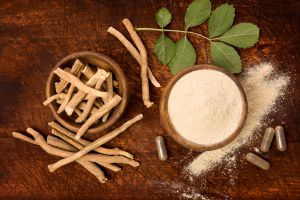
In a well-designed clinical trial by Chandrasekhar et al., Ashwagandha extract administered to individuals under chronic stress significantly reduced their serum cortisol levels compared to the study participants who received a placebo. Study participants that received the Ashwagandha extract also showed substantial improvements on four additional stress assessments.
After only 60 days of supplementation, the Ashwagandha extract:
- Reduced the “Anxiety and Insomnia” score on the General Health Questionnaire (GHQ-28) by an astounding 69.7%
- Reduced the “Stress” score on the Depression Anxiety Stress Scale (DASS) by a whopping 64.2%
- Reduced the “Anxiety” score on the DASS by an impressive 75.6%
- Significantly reduced the score on the Perceived Stress Scale (PSS) by 44%9
Administering Ashwagandha in animal models also significantly improves cortisol output and depression- and anxiety-associated behavior triggered by social isolation.8
Furthermore, animal studies suggest Ashwagandha offers anti-inflammatory, antioxidant, immunomodulatory, neuro-regenerative, nootropic, neuroprotective, hepatoprotective, cardio-protective, nephroprotective, cholesterol-lowering, anti-bacterial, antifungal, and antiviral benefits. In addition, Ashwagandha has been shown to raise active thyroid hormone levels and could even be an antidote for arsenic toxicity.10,11
According to a clinical trial by Wankhede et al., Ashwagandha supplementation in humans is also associated with significant increases in muscle mass and strength, which suggests that Ashwagandha supplementation could be highly valuable when taken during a resistance training program.12

Vitamin B-6 (Pyridoxine HCl)
Nutrients are the foundational support for the adrenal glands since they are needed for the production of hormones.13 As a coenzyme involved in over 150 biochemical reactions in your body, vitamin B6 is a fascinating molecule. Vitamin B6 contributes to the metabolism of carbohydrates, lipids, amino acids, and nucleic acids; and optimal cellular signaling.14 Recent evidence shows vitamin B6 protects the body from free radicals and other environmental stressors.15
Moreover, research shows a deficiency of vitamin B6 reduces the production of nicotinamide adenine dinucleotide, which is also known as NAD+ or NAD. NAD is required for cellular energy, an optimal circadian rhythm, and resistance to metabolic stress.14,16 In addition, vitamin B6 is necessary for the metabolism of several important neurotransmitters associated with stress, most notably GABA, 5-HTP, serotonin, and dopamine.8
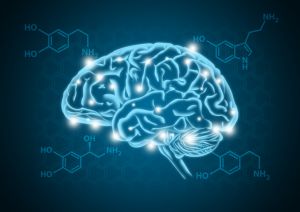
Biotin
Biotin is involved in the regulation of genes that control glucose metabolism, and clinical studies demonstrate improvement in blood glucose control with biotin supplementation. Because of biotin’s effects on regulating blood glucose, biotin is most supportive to the adrenal glands when cortisol levels are abnormal due to blood glucose management issues or insulin dysregulation, including insulin resistance.13
A study that included over 7000 adults found that a higher intake of biotin is associated with a lower prevalence of depression, anxiety, and stress.17 An animal study demonstrated increased life span and improved stress resiliency with biotin supplementation. Reports also suggest biotin supplementation improves energy levels.13

Vitamin B-5 (Calcium-D-Pantothenate)
In the research literature, pantothenic acid has been shown to raise cortisol levels when needed, improve stress resiliency, improve the acute stress response, and act as a modulating agent for adrenal function. Pantothenic acid is a precursor for the production of acetyl coenzyme A (acetyl-CoA), a compound that is essential for the production of steroid hormones.13 Therefore, the adrenal glands require pantothenic acid to produce several adrenal hormones.13,18
Acetyl-CoA and pantothenic acid are also required to generate ATP and ketones in the mitochondria.19 Pantothenic acid, via acetyl-CoA, also contributes to the structure and function of brain cells since acetyl-CoA is involved in the synthesis of cholesterol, amino acids, phospholipids, and fatty acids; and is needed for the production of multiple neurotransmitters.20
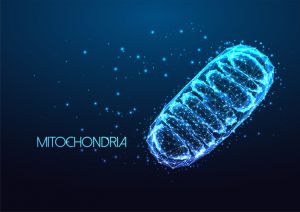
Zinc (Zinc Ascorbate)
Zinc is an essential trace mineral required for the activity of over 300 crucial enzymes in the body, so a zinc deficiency could significantly impair health.21 Zinc is critical for optimal adrenal function since zinc plays a role in cortisol release, and adequate zinc levels stabilize serum cortisol levels over time. Research shows zinc deficiency impairs the healthy stress response, exacerbates hormone imbalances, and contributes to the onset of adrenal fatigue.5
In humans, an optimal zinc level after surgery helps maintain a stable cortisol level and prevents the sharp increase in cortisol that tends to occur post-op.13 Research studies on the effect of zinc metabolism in athletes show that alterations in zinc metabolism due to increased zinc excretion and higher stress levels lead to latent fatigue with decreased endurance.5
Zinc is also required to make several neurotransmitters and hormones, including serotonin and melatonin; therefore, a zinc deficiency could affect the circadian rhythm and sleep-wake cycle via mechanisms other than its effect on cortisol production. Prolonged stress depletes zinc concentrations in the blood. Therefore, given that the body has no specialized zinc storage system, regular daily zinc intake is required to prevent the many health problems that could be caused by a zinc deficiency.5

Copper (Copper Citrate)
Copper is an essential trace element that serves many important functions in the body.5 Copper acts as a cofactor and structural component of several enzymes, including those required for energy production in the mitochondria, as well as serotonin and norepinephrine metabolism.5,22 A copper deficiency can cause symptoms of adrenal dysfunction, including fatigue.5
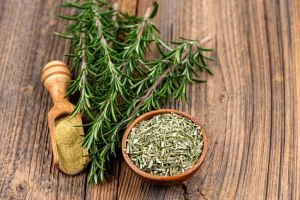
Rosemary (Rosmarinus officinalis)
An animal study that evaluated the effect of rosemary extract on the stress response system, including the hypothalamic-pituitary-adrenal (HPA) axis and brain neurotransmitters, discovered the inhalation of rosemary essential oil lowered the serum corticosterone level and beneficially regulated neurotransmitter levels in the brain to alleviate stress.23
Additional research suggests that rosemary offers anti-inflammatory, analgesic, anti-anxiety, memory boosting, antimicrobial, antioxidant, anti-tumorigenic, and neuroprotective benefits. Historically, rosemary has been used in folk medicine to treat many stress-related health concerns, including nervous agitation, headaches, depression, physical exhaustion, memory concerns, and mental fatigue.24
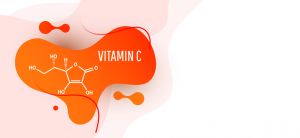
Vitamin C
Excessive stress leads to the increased use of vitamin C; therefore, increasing the intake of vitamin C during stressful times is necessary to maintain optimal health. Vitamin C acts as an antioxidant in the brain and is a co-factor for the synthesis of adrenaline and other neurotransmitters.1 Furthermore, vitamin C plays a role in the modulation of dopamine, norepinephrine, serotonin, acetylcholine, and glutamate levels in the brain. A vitamin C deficiency can even directly affect brain function since collagen type IV, which requires vitamin C for synthesis, is essential for healthy nerve cell structure and electrical activity in the brain.25
Vitamin C is required for several adrenal functions and offers a modulatory effect on the HPA axis. Vitamin C is necessary for cortisol synthesis since it is a co-factor for the enzymes present in the adrenal glands. Animal studies suggest that, while vitamin C is required for cortisol production, an optimal vitamin C level can reduce the amount of cortisol released due to stress. In fact, vitamin C acts like the brakes on a car with regard to the stress response and can halt an excessive stress response. A vitamin C deficiency can even be an underlying cause of elevated cortisol levels, according to animal studies.25
In clinical trials, supplementation with vitamin C was effective in reducing anxiety, decreasing stress levels, improving recovery from mental stress, boosting mood, and improving blood pressure levels in stressed participants.1,25

Organic Citrus Bioflavonoid Complex
Bioflavonoids are a broad class of health-promoting compounds found in numerous plants. Research shows many bioflavonoid-rich plants offer beneficial effects on adaptation to stress, the stress response, and more.13
Citrus bioflavonoids exert neuroprotective effects in animal studies. These animal studies also showed bioflavonoid compounds and their metabolites readily cross the blood-brain barrier, which prompted researchers to initiate several clinical trials in humans. The results of these clinical trials demonstrate intake of citrus bioflavonoids improves cognitive function and reduces disease risk in both unhealthy and healthy subjects.26
Specifically, bioflavonoid intake may reduce the risk of depression, anxiety, abnormal blood glucose levels, and abnormal cholesterol levels. Citrus bioflavonoids have also been shown to positively impact the HPA axis via their regulation of the biological clock and circadian rhythms.25
Daily supplementation with a citrus bioflavonoid complex also improves athletic performance. Clinical trials show that bioflavonoids significantly increase average power by 2.3% to 5%, maximum speed by 3.2%, peak power by 3.7%, and total energy by 2.6% without increasing the maximum heart rate (HR). Furthermore, bioflavonoids may exert other intracellular effects that support mitochondrial function and induce the biogenesis of new mitochondria, which could then produce additional energy for further gains. Learn more about the effects of organic citrus bioflavonoid complex on athletic performance here.21
Accumulating evidence from clinical and epidemiological research suggests that daily consumption of an organic citrus bioflavonoid complex supports adrenal function, metabolic health, athletic performance, and brain health.21,26

Magnesium
Magnesium is required for the optimal function of over 600 enzymes in the body. Magnesium is involved in DNA synthesis, RNA expression, muscle and nerve cell signaling, glucose metabolism, energy production, stress hormone production and release, blood pressure control, and more.27
Magnesium deficiency is common in the modern world and increases the risk of developing many health concerns. The symptoms of magnesium deficiency and stress are surprisingly similar. The most common symptoms of magnesium deficiency include fatigue, irritability, and anxiety.28 Additional symptoms of and conditions associated with a magnesium deficiency include insulin resistance, muscle weakness, increased inflammation, oxidative stress, stomach cramps, high blood pressure, metabolic syndrome, headaches, sleep disorders, and nausea.27,28
Fatigue is a common symptom of magnesium deficiency because all processes in the body that require energy also require magnesium. Magnesium is needed to shuttle adenosine triphosphate (ATP) out of the mitochondria after it is produced. ATP is cellular energy.29,30 Learn more about energy, magnesium, and ATP HERE.
Excessive stress also increases the need for magnesium in several ways. Extra magnesium is required for the increased demand for cellular energy production and stress hormone synthesis during stressful times. Furthermore, stress boosts the need for magnesium because the presence of stress hormones increases the amount of magnesium that leaves the body via urination.31,32
As magnesium leaves the body, a low magnesium level can then reduce the body’s resistance to stress by increasing the secretion of stress hormones, including cortisol. The stress hormones then further deplete magnesium levels, creating a vicious cycle of increased stress and dysfunction.33 When a healthy diet is not enough to maintain an adequate magnesium status, magnesium supplementation tends to be well-tolerated and beneficial.29
So, stress increases the need for magnesium and depletes magnesium, but does supplementation with magnesium decrease stress levels?
Yes! Research confirms magnesium supplementation significantly reduces stress in severely stressed individuals.33

Synergistic Stress-Relieving Effects of Magnesium PLUS B-6*
Research also suggests an additional synergistic effect when magnesium is combined with vitamin B6.33 We already discussed the importance of vitamin B6 for optimal adrenal function, but the combination of vitamin B6 and magnesium appears to enhance the positive effects of supplementation in severely stressed individuals.33
The mechanism by which combining magnesium and vitamin B6 leads to reduced stress remains to be defined, but; vitamin B6 may offer direct and indirect effects on stress and the function of the HPA axis. Researchers suspect vitamin B6 may play a role in the entry of magnesium into nerve cells and the distribution of magnesium in the brain.33
They also suggest that vitamin B6 may directly reduce brain noradrenaline levels and modulate gamma-amino butyric acid (GABA) synthesis, resulting in stress relief that complements the effects of magnesium.33 Overall, research shows the combination of vitamin B6 and magnesium could be a powerful component of a comprehensive stress management program.

Phosphatidylserine
Phosphatidylserine (PS) is an essential phospholipid. Up to 10% of the phospholipid content present in cell membranes is phosphatidylserine. PS is necessary for proper cell-to-cell recognition and communication. PS is known to enhance cellular metabolism and the transfer of biochemical messages by regulating the function of membrane proteins and influencing the fluidity of the cell membrane. PS regulates cell receptors, enzymes, ion channels, and signaling molecules to directly affect the function of hormones and intellectual abilities.
According to medical research, supplemental PS also enhances mood, immunity, and the capacity to cope with stress. Many consider supplementing with PS to modulate aspects of the stress response and improve stress adaptation, especially those with circadian rhythm disorders.
One clinical trial determined a supplement with a combination of PS, essential fatty acids, and antioxidants was effective at improving mood, balancing high cortisol levels, and normalizing the daily circadian rhythm in a subset of elderly patients with major depression. Additional clinical studies in middle-aged and younger adults note similar benefits of supplemental PS in reducing perceived stress and optimizing the cortisol response during demanding mental tasks.
Several additional clinical trials confirm supplemental PS modulates the stress response during strenuous exercise training. In an early study, PS effectively blunted the rise of cortisol in response to strenuous exercise in healthy young men. Likewise, PS supplementation decreased the cortisol response to intensive resistance training by 20 percent, reduced muscle soreness, and improved the perception of well-being in young male athletes participating in intensive exercise training.
Another recent study confirmed and elaborated on these results, finding that PS lowers resting cortisol levels before exercise, reduces overall cortisol output during physical activity, and increases the testosterone to cortisol ratio after exercise. So, supplementation with PS may improve exercise capacity, antioxidant protection, cognitive function, hormone balance, and performance related to athletic training.
Overall, phosphatidylserine supplements appear to effectively improve memory, support adaptability to stress, moderate the perception of stress load and enhance actual performance and recovery in a variety of stressful situations, including intensive exercise training and demanding mental and emotional tasks.34
For more information about phosphatidylserine, consider reading this unique blog series about phospholipids and their components HERE!

Thyroid Support
Hypothyroidism is one of the most common chronic diseases worldwide, and it causes low levels of the thyroid hormones thyroxine (T4) and triiodothyronine (T3).35 Hypothyroidism can lead to adrenal dysfunction. Specifically, hypothyroidism is associated with a reduction in the weight of the adrenal glands, decreased production of cortisol, and an abnormal circadian rhythm.36
Therefore, thyroid support could provide adrenal support when thyroid function is sub-optimal. Nutrients and botanicals that support optimal thyroid function include L-tyrosine, iodine, Commiphora mukul, L-cysteine, and Ashwagandha.
L-tyrosine is an amino acid that is the precursor of T4, T3, and the adrenal medullary hormones epinephrine and norepinephrine. The tyrosine level in the blood tends to be lower in individuals with hypothyroidism.37 Research shows supplementation with tyrosine increases thyroid hormone levels.38
The essential trace mineral iodine is required for the synthesis of thyroid hormones. The average adult body contains around 15 to 20 mg of iodine, and most of it is stored in the thyroid gland. Iodine supplementation in individuals who do not consume or absorb enough iodine is beneficial. It is possible to consume too much iodine, so be mindful when taking or prescribing iodine.39
Research suggests the guggulsterones extracted from Commiphora mukul support thyroid function by enhancing the concentration of triiodothyronine (T3) and improving the T3/T4 ratio in the body. Administration of isolated guggulsterones to animal models significantly increases all thyroid function parameters, including:
- The uptake of iodine by the thyroid
- The activity of the enzymes involved in the synthesis of thyroid hormones
- Oxygen uptake by thyroid tissue40
L-cysteine is an amino acid that is required for the production of glutathione (GSH). GSH is critical for optimal thyroid hormone metabolism since it is necessary for the function of the enzyme that converts the T4 thyroid hormone to the active T3 thyroid hormone. Furthermore, GSH affects the uptake of the active T3 thyroid hormone into cells. Animals fed a cysteine-deficient diet suffered from decreased thyroid function and impaired peripheral metabolism of the thyroid hormones.41
Ashwagandha, as discussed above, also supports healthy thyroid function.10,11 Several clinical trials and animal studies confirm treatment with Ashwagandha supports thyroid function in those with hypothyroidism.42-45

It is common for chronic stress to lead to adrenal dysfunction that could result in health concerns. When taken regularly, nutrients, herbs, and other nutraceuticals support the optimal function of the HPA axis and help alleviate the symptoms of chronic stress, including insomnia, depression, anxiety, and fatigue.13
A comprehensive stress management protocol could also reduce the risk of developing stress-related diseases, including dementia, heart disease, high blood pressure, insulin resistance, obesity, diabetes, osteoporosis, and other chronic conditions.5 Restoring and optimizing adrenal function is truly a priority for those patients who wish to level up their health and achieve their long-term wellness goals.
To test for the presence of adrenal fatigue, consider ordering an Adrenal Stress Index Panel.
To place a test order, click here. As a reminder, DiagnosTechs can drop ship test kits directly to your patients. You may select this option at the top of the order form.
Please visit our Provider Tools page for more information about adrenal fatigue, adrenal restoration, and our test panels.
References:
- McCabe D, Lisy K, Lockwood C, Colbeck M. The impact of essential fatty acid, B vitamins, vitamin C, magnesium and zinc supplementation on stress levels in women: a systematic review. JBI Database System Rev Implement Rep. 2017;15(2):402-453. doi:10.11124/JBISRIR-2016-002965
- Speers AB, Cabey KA, Soumyanath A, et al. Effects of Withania somnifera (Ashwagandha) on Stress and the Stress- Related Neuropsychiatric Disorders Anxiety, Depression, and Insomnia. Curr Neuropharmacol. 2021;19(9):1468-1495. doi:10.2174/1570159X19666210712151556
- Feldt M. Neurological health – stress and adrenal support. Fullscript. https://fullscript.com/protocol/neurological-health-stress-and-adrenal-support. Published May 27, 2022. Accessed August 3, 2022.
- Sjörs Dahlman A, Jonsdottir IH, Hansson C. The hypothalamo-pituitary-adrenal axis and the autonomic nervous system in burnout. Handb Clin Neurol. 2021;182:83-94. doi:10.1016/B978-0-12-819973-2.00006-X
- Trimnell A, Canar L, Firetag L. CHRONIC STRESS – The Physical & Emotional Tolls. July 2020. https://www.diagnostechs.com/providers/DTIClient/PDF/Chronic-Stress-Physical-and-Emotional-Tolls.pdf. Accessed August 4, 2022.
- Sarris J, McIntyre E, Camfield DA. Plant-based medicines for anxiety disorders, part 2: a review of clinical studies with supporting preclinical evidence. CNS Drugs. 2013;27(4): 301-19. doi:10.1007/s40263-013-0059-9.
- Dutta R, Khalil R, Green R, et al. Withania Somnifera (Ashwagandha) and Withaferin A: Potential in Integrative Oncology. Int J Mol Sci. 2019;20(21):5310. doi:10.3390/ijms20215310
- Head KA, Kelly GS. Nutrients and botanicals for treatment of stress: adrenal fatigue, neurotransmitter imbalance, anxiety, and restless sleep. Altern Med Rev. 2009;14(2):114-40.
- Chandrasekhar K, Kapoor J, Anishetty S. A prospective, randomized double-blind, placebo-controlled study of safety and efficacy of a high-concentration full-spectrum extract of ashwagandha root in reducing stress and anxiety in adults. Indian J Psychol Med. 2012;34(3):255-262. doi:10.4103/0253-7176.106022
- Saleem S, Muhammad G, Hussain MA, et al. Withania somnifera L.: Insights into the phytochemical profile, therapeutic potential, clinical trials, and future prospective. Iran J Basic Med Sci. 2020;23(12):1501-1526.
- Panda S, Kar A. Changes in thyroid hormone concentrations after administration of ashwagandha root extract to adult male mice. J Pharm Pharmacol. 1998;50(9):1065-8. doi:10.1111/j.2042-7158.1998.tb06923.x
- Wankhede S, Langade D, Joshi K, et al. Examining the effect of Withania somnifera supplementation on muscle strength and recovery: a randomized controlled trial. J Int Soc Sports Nutr. 2015;12:43. doi:10.1186/s12970-015-0104-9
- Buesing, A Foundational Approach to Adrenal Restoration. Chronobiology. 2015;3(20):1-3,6. https://www.diagnostechs.com/2015/04/07/a-foundational-approach-to-adrenal-restoration/. Accessed August 8, 2022.
- Stach K, Stach W, Augoff K. Vitamin B6 in Health and Disease. Nutrients. 2021;13(9):3229. doi:10.3390/nu13093229
- Mooney S, Leuendorf JE, Hendrickson C, et al. Vitamin B6: a long known compound of surprising complexity. Molecules. 2009;14(1):329-351. doi:10.3390/molecules14010329
- Groth B, Venkatakrishnan P, Lin SJ. NAD+ Metabolism, Metabolic Stress, and Infection. Front Mol Biosci. 2021;8:686412. doi:10.3389/fmolb.2021.686412
- Mahdavifar B, Hosseinzadeh M, Salehi-Abargouei A, et al. Dietary intake of B vitamins and their association with depression, anxiety, and stress symptoms: A cross-sectional, population-based survey. J Affect Disord. 2021;288:92-98. doi:10.1016/j.jad.2021.03.055
- Pan L, Jaroenporn S, Yamamoto T, et al. Effects of pantothenic acid supplement on secretion of steroids by the adrenal cortex in female rats. Reprod Med Biol. 2011;11(2):101-104. doi:10.1007/s12522-011-0113-6
- Pietrocola F, Galluzzi L, Bravo-San Pedro JM, et al. Acetyl coenzyme A: a central metabolite and second messenger. Cell Metab. 2015;21(6):805-821. doi:10.1016/j.cmet.2015.05.014
- Kennedy DO. B Vitamins and the Brain: Mechanisms, Dose and Efficacy–A Review. Nutrients. 2016;8(2):68. doi:10.3390/nu8020068
- Summertime Nutrition for Men. Interplexus. https://interplexus.com/blogs/news/summertime-nutrition-for-men. Published June 15, 2022. Accessed January 31, 2023.
- Lutsenko S, Washington-Hughes C, Ralle M, et al. Copper and the brain noradrenergic system. J Biol Inorg Chem. 2019;24(8):1179-1188. doi:10.1007/s00775-019-01737-3
- Villareal MO, Ikeya A, Sasaki K, et al. Anti-stress and neuronal cell differentiation induction effects of Rosmarinus officinalis L. essential oil. BMC Complement Altern Med. 2017;17(1):549. doi:10.1186/s12906-017-2060-1
- Ghasemzadeh Rahbardar M, Hosseinzadeh H. Therapeutic effects of rosemary (Rosmarinus officinalis) and its active constituents on nervous system disorders. Iran J Basic Med Sci. 2020;23(9):1100-1112. doi:10.22038/ijbms.2020.45269.10541
- Moritz B, Schmitz AE, Rodrigues ALS, et al. The role of vitamin C in stress-related disorders. J Nutr Biochem. 2020;85:108459. doi:10.1016/j.jnutbio.2020.108459
- Matsuzaki K, Nakajima A, Guo Y, et al. A Narrative Review of the Effects of Citrus Peels and Extracts on Human Brain Health and Metabolism. Nutrients. 2022;14(9):1847. doi:10.3390/nu14091847
- Dominguez L, Veronese N, Barbagallo M. Magnesium and Hypertension in Old Age. Nutrients. 2020;13(1):139. doi:10.3390/nu13010139
- Pickering G, Mazur A, Trousselard M, et al. Magnesium Status and Stress: The Vicious Circle Concept Revisited. Nutrients. 2020;12(12):3672. doi:10.3390/nu12123672
- Barbagallo M, Veronese N, Dominguez LJ. Magnesium in Aging, Health and Diseases. Nutrients. 2021;13(2):463. doi:10.3390/nu13020463
- Upgrade your energy this summer! InterPlexus. https://interplexus.com/blogs/news/upgrade-your-energy-this-summer. Published July 8, 2022. Accessed January 31, 2023.
- Nayyar M, Yusuf J, Khan MU, et al. K+ and Mg2+ Dyshomeostasis in Acute Hyperadrenergic Stressor States. Am J Med Sci. 2017;353(5):422-424. doi:10.1016/j.amjms.2017.01.001
- McCabe D, Lisy K, Lockwood C, et al. The impact of essential fatty acid, B vitamins, vitamin C, magnesium and zinc supplementation on stress levels in women: a systematic review. JBI Database System Rev Implement Rep. 2017;15(2):402-453. doi:10.11124/JBISRIR-2016-002965
- Noah L, Pickering G, Mazur A, et al. Impact of magnesium supplementation, in combination with vitamin B6, on stress and magnesium status: secondary data from a randomized controlled trial. Magnes Res. 2020;33(3):45-57. doi:10.1684/mrh.2020.0468
- Everything you need to know about the safety and benefits of phospholipids. InterPlexus. https://interplexus.com/blogs/news/the-safety-and-benefits-of-phospholipids-and-their-components. Published September 22, 2022. Accessed January 31, 2023.
- Chiovato L, Magri F, Carlé A. Hypothyroidism in Context: Where We’ve Been and Where We’re Going. Adv Ther. 2019;36(Suppl 2):47-58. doi:10.1007/s12325-019-01080-8
- Tohei A. Studies on the functional relationship between thyroid, adrenal and gonadal hormones. J Reprod Dev. 2004;50(1):9-20. doi:10.1262/jrd.50.9
- Rivlin R, Asper SP. Tyrosine and the thyroid hormones. Am J Med. 1966;40(6):823-827. doi:10.1016/0002-9343(66)90198-7
- Tahara Y, Hirota M, Shima K, et al. Primary hypothyroidism in an adult patient with protein-calorie malnutrition: a study of its mechanism and the effect of amino acid deficiency. Metabolism. 1988;37(1):9-14. doi:10.1016/0026-0495(88)90022-4
- Knezevic J, Starchl C, Tmava Berisha A, et al. Thyroid-Gut-Axis: How Does the Microbiota Influence Thyroid Function?. Nutrients. 2020;12(6):1769. doi:10.3390/nu12061769
- Sarup P, Bala S, Kamboj S. Pharmacology and Phytochemistry of Oleo-Gum Resin of Commiphora wightii (Guggulu). Scientifica (Cairo). 2015;2015:138039. doi:10.1155/2015/138039
- Suberville C, Higueret P, Taruoura D, et al. Glutathione deficiency and peripheral metabolism of thyroid hormones during dietary cysteine deprivation in rats. Br J Nutr. 1988;59(3):451-456. doi:10.1079/bjn19880054
- Sharma AK, Basu I, Singh S. Efficacy and Safety of Ashwagandha Root Extract in Subclinical Hypothyroid Patients: A Double-Blind, Randomized Placebo-Controlled Trial. J Altern Complement Med. 2018;24(3):243-248. doi:10.1089/acm.2017.0183
- Abdel-Wahhab KG, Mourad HH, Mannaa FA, et al. Role of ashwagandha methanolic extract in the regulation of thyroid profile in hypothyroidism modeled rats. Mol Biol Rep. 2019;46(4):3637-3649. doi:10.1007/s11033-019-04721-x
- Gannon JM, Forrest PE, Roy Chengappa KN. Subtle changes in thyroid indices during a placebo-controlled study of an extract of Withania somnifera in persons with bipolar disorder. J Ayurveda Integr Med. 2014;5(4):241-245. doi:10.4103/0975-9476.146566
- Hosny EN, El-Gizawy MM, Sawie HG, et al. Neuroprotective Effect of Ashwagandha Extract against the Neurochemical Changes Induced in Rat Model of Hypothyroidism. J Diet Suppl. 2021;18(1):72-91. doi:10.1080/19390211.2020.1713959

